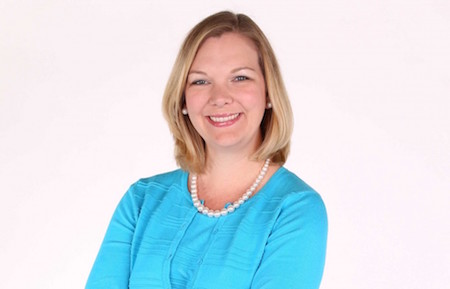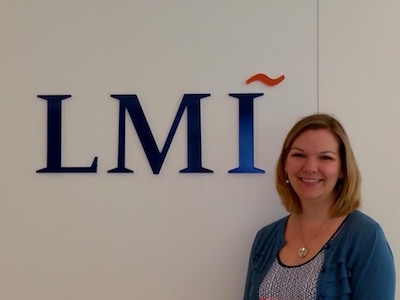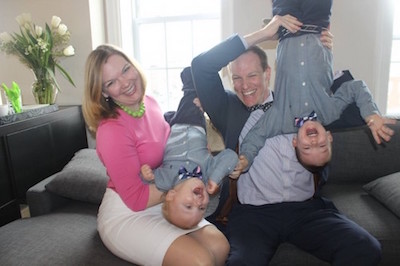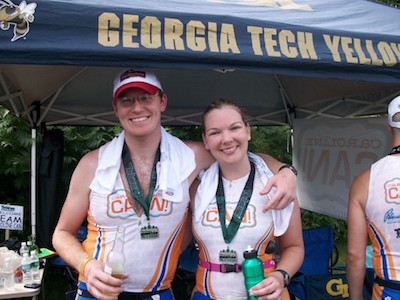
Whitney Owen
Since Graduation
As an international affairs major and public policy minor, I was interested in the United States’ role in foreign policy and how the U.S. government plays a stabilization role in the global economy. During my senior year at Georgia Tech I was a policy intern at former Georgia Governor Sonny Perdue’s office, and I reported to Ivan Allen College alumnus Trey Childress (M.S. Public Policy 2002, B.S. International Affairs 2000) who was COO. I was planning to go to law school after I graduated, but working with Trey introduced me to the possibility of earning a master’s degree in public administration, a management-based field involving government and nonprofits that aligned with my career interests. That internship experience during my senior year put me on the trajectory to pursue a graduate degree, and I spent two years earning a master’s in public administration at George Washington University in Washington, D.C.
After I received my master’s degree in 2006, I was offered a full-time job with Perdue’s reelection campaign. I had previously spent eight months working with his 2004 reelection campaign after graduating from Georgia Tech, but I decided to stay in Washington, D.C. because I didn’t want to limit myself to only working for the Georgia state government. I took a job at the nonprofit government consulting firm LMI and completed a management rotational program where I learned about different parts of the company. I was then promoted to a program manager title and became the youngest manager in the company at that time. I’m currently LMI’s director of health care management, and as of this summer I will have been with the company for 10 years, which is hard to believe.
Working as LMI’s Director of Health Care Management
I oversee a couple of major programs for our Centers for Medicare and Medicaid Services (CMS) clients. One is the Medicare Advantage program, which encompasses about one-third of Medicare enrollees. Our team reviews all of the commercially-sponsored health plans that might be sold as Medicare Advantage plans, so we get a ton of data from the commercial health insurers. We review all of their submissions annually for compliance with laws and regulations, and then we do ad hoc analysis and visualization of their data. In addition, when the Affordable Care Act (ACA) was passed in 2010 we won two additional major program contracts. We work on the marketplace where individuals and small businesses go and purchase their health insurance, and our team reviews all of the plans that are sold on the exchanges in the 38 states that have federally-facilitated marketplaces.
My main responsibilities pertain to program management. I'm responsible for the client relationship and making sure the right people are assigned to the specific tasks that we're asked to complete. I make sure we're providing quality deliverables and staying on schedule. I also make sure we're staying within budget and hiring the right people with the right skill sets to meet our clients' needs.
Challenges and Rewards
 The programs we work with are often politically sensitive and public-facing, and our clients are often in the spotlight. We have to try to balance expectations of what can be done in a high-quality way on short timeframes, and I think this is a big challenge that we face. It has been really interesting to work on national healthcare programs, but it comes with a lot of challenges.
The programs we work with are often politically sensitive and public-facing, and our clients are often in the spotlight. We have to try to balance expectations of what can be done in a high-quality way on short timeframes, and I think this is a big challenge that we face. It has been really interesting to work on national healthcare programs, but it comes with a lot of challenges.
It’s easy to forget during the day-to-day when I’m stressing about meeting deliverable deadlines that we’re really helping to implement a brand new government program that people are going to read about in history books. I think that’s pretty cool. And, putting all politics aside, the ACA is enrolling people across the country that previously may not have had health insurance. That is the most rewarding part of the job, knowing that our little piece of the puzzle helps toward a broader goal of giving Americans access to good health.
What the Ivan Allen College Taught Me
The analytical skill set that I developed in the Ivan Allen College and at Georgia Tech is invaluable. I think the Ivan Allen College is really a step ahead of other liberal arts programs because we're required to take those harder skill classes like computer science and calculus. We don't get the option to sidestep those courses like many students at more traditional liberal arts colleges.
In my current job, we hire Georgia Tech grads. We're looking for those hard skills. People who can pontificate and write long academic papers are great, but my clients don't want that. They're looking for people with real analytical skills who can write a two-page memo and get to the point. I think the Ivan Alan College taught me how to pull out the salient points in policy and then provide that information to stakeholders.
Interests and Hobbies
 My job keeps me fairly busy, although in the consulting world I have great hours compared to a lot of other firms. I have two little boys, a 4-year-old, James, and a 17-month-old, Andrew. They keep me quite busy as well.
My job keeps me fairly busy, although in the consulting world I have great hours compared to a lot of other firms. I have two little boys, a 4-year-old, James, and a 17-month-old, Andrew. They keep me quite busy as well.
I love spending time with family and friends. I love to cook, entertain, and host parties, and I do a spin class once a week to try and stay healthy. I'm on the Georgia Tech Alumni Association’s board of trustees, so I come down to Atlanta quarterly to meet with the board. I enjoy staying connected to Tech. In addition, I serve on the advisory board for my graduate program at George Washington University’s Trachtenberg School of Public Policy and Public Administration.
Advice for Current Students
 Ivan Allen College students definitely need to have internship experiences or participate in a co-op program. Everybody has work experience now, and if you don't have it you are way behind the curve. But in addition to just competing with your peers, I think it really can help you identify what you want and don't want in your career before you commit to something. It kept me from going to law school when I thought that's what I really wanted to do with my life, and I learned that I wanted to follow a different path. Internships and co-ops are great opportunities to kind of feel that out.
Ivan Allen College students definitely need to have internship experiences or participate in a co-op program. Everybody has work experience now, and if you don't have it you are way behind the curve. But in addition to just competing with your peers, I think it really can help you identify what you want and don't want in your career before you commit to something. It kept me from going to law school when I thought that's what I really wanted to do with my life, and I learned that I wanted to follow a different path. Internships and co-ops are great opportunities to kind of feel that out.
I would also advise students to make sure that they try to take some courses that will give them some more analytical or tool-based skills that they can translate into a job. The job market is very competitive these days, and there are a lot of people that come out of school and are good writers, analysts, or communicators. But if somebody can do all of those things and knows SAS or is an advanced user of Excel or something else that is popular in the workplace, then that would put them leaps and bounds ahead of other candidates.
